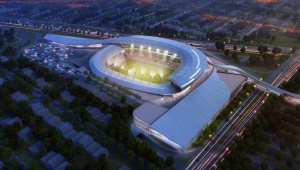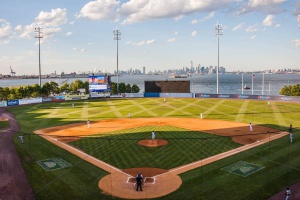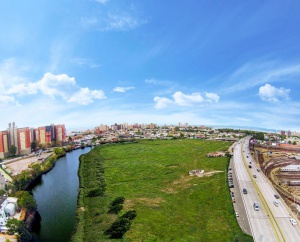Two New Venue Possibilities Are A Litmus Test & Legacy Opportunity For Cosmos Ownership
The issue of a permanent home for the New York Cosmos has been prominent since the club’s re-launch in 2013. The early days of the reboot era were bolstered by hopes that the Cosmos would win an RFP for land at Belmont Park. The previous ownership group, led by Seamus O’Brien and Sela Sport, intended to privately fund a state-of-the-art 25,000 seat stadium anchoring a total $400M mixed-used development which also would offer other revenue opportunities for the club in terms of a hotel and rentable retail space. That RFP process famously dragged out for years until it was ultimately scrapped in what appeared to be a successful attempt to shut out the original bidders and re-open the bidding to accommodate the New York Islanders for their new NHL arena.
The demise of the Belmont RFP process roughly coincided with the demise of the Seamus O’Brien and Sela Sport ownership of the Cosmos. The issue of a permanent home for the club took a back seat for a while after Rocco Commisso swooped in to buy the Cosmos at the 11th hour in December 2016, preventing the possible acquisition and mothballing of the brand by Major League Soccer (based on documents from the NASL antitrust lawsuit). The club moved to MCU Park in Brooklyn for the 2017 season, where it saw attendance increase and a better gameday atmosphere than in the final two years at Shuart Stadium at Hofstra University on Long Island.

MCU Park was an expensive option rumored to cost the club upwards of $75k-$100k per match, which was unsustainable in the NASL and a non-starter when the club was forced to move to NPSL after the NASL was de-sanctioned and became mired in the on-going antitrust suit against the USSF. While some fans pushed for a return to MCU Park when the club announced its return to professional soccer in NISA, COVID-19 and the lack of ability to host crowds made keeping venue expenses to a minimum at Long Island’s Mitchel Field sound business. The reorganization of Minor League Baseball that has resulted in the Brooklyn Cyclones moving from a short-season operation from June-August to a full season operation from April-August makes MCU Park seem an even less likely destination for the Cosmos in the future.
While the world is still mired in the horrors of the COVID-19 pandemic, there is light at the end of the tunnel in the form of multiple vaccines that have begun to be administered to the population. Stadium projects tend to take years to come to fruition, so planning on a stadium now makes sense since, by the time it is ready, the world should be relatively back to normal again.
Two new and interesting options have emerged for potential venues in New York City in recent months. The lesser option comes in Staten Island, where the same reorganization of Minor League Baseball that has seen the Brooklyn Cyclones move to full-season ball, has seen the Staten Island Yankees eliminated. This potentially opens up Richmond County Bank Ballpark, right near the Staten Island Ferry, for other pro sports teams. The city has allocated $5.1M to renovate the ballpark to suit other sports such as soccer and rugby. Staten Island is not considered an ideal location for the Cosmos because it is not accessible via the subway, making it potentially harder to get to than desirable for fans in the other four boroughs and Long Island. But it would be a professional venue in the City with iconic sightlines of lower Manhattan. The suitableness of the stadium location is hotly debated by Cosmos fans.

The newer and more interesting opportunity comes in the form of a 16-acre lot on the border of Gravesend and Coney Island in Brooklyn that has been put on the market by National Grid, which is seeking to sell to a private developer. It is not without its own warts, however. Located in between the Belt Parkway and Coney Island Creek, the lot is not easily accessible via roads but theoretically could be connected via pedestrian bridges to Coney Island, within a short walk of three subway stops. Fans traveling by car would seemingly need to rely on parking lots in the area. Prior to National Grid’s acquisition of the lot in 2006, the lot was owned by the Brooklyn Borough Gas Company, whose successor firm Brooklyn Union Gas was forced by New York State to remediate the land “which had been heavily contaminated with gas, pesticides, and other harmful toxins” for a period of two years per the Brooklyn Paper report. JLL, the real estate firm that is offering the lot on the market, says the land is fully remediated to meet New York State’s standards and ready for redevelopment per a Crain’s report. A standard environmental site assessment as part of the land acquisition process could confirm that. Crain’s foresees interest among residential developers who have recently taken on projects in the Coney Island area, but speculates that retail development may be less likely due to the impact of COVID-19 on retail.
These two new options present a litmus test of sorts for the Cosmos ownership, which has grown increasingly distant from Cosmos fans since Rocco Commisso’s acquisition of ACF Fiorentina in Serie A. Commisso has invested substantially in Fiorentina including a reported $150-$200M to buy the club as well as building a new training facility for a reported $55M. The Cosmos appear to have been back burnered and run on a minimum budget during this time. While spending more money on Fiorentina than the Cosmos is common sense given the far greater revenue opportunities in Italy, the ownership’s apparent minimal investment, relative silence and the team’s disappointing on-field results have brought about a sense of neglect across Cosmos Country, with many fans fearing Rocco has lost his passion for the club that was so evident in 2017 and 2018.
It is hard to see a better way for Commisso to show that he still has big plans for the Cosmos than for the multi-billionaire owner to acquire the 16-acre lot at 2731 West 12th Street, upon which the club could either build the long-awaited stadium or use it as part of a favorable land swap with the City if they truly want to build the parking garages for the sanitation department there as outlined in the Brooklyn Paper report. The lot is in an Opportunity Zone, which means there would be tax abatement benefits for building on the site for 15-25 years.
The Brooklyn lot offers a rare opportunity to acquire enough land to build a stadium in a key target area of the city for the Cosmos. The club established some roots in Brooklyn from its season at MCU and the area of southern Brooklyn gives the club geographic separation from NYCFC, New York Red Bulls, Queensboro FC and New Amsterdam FC while remaining accessible to City-based fans via the subways. If Commisso were to ramp the marketing budget back up to the MCU days, it would be easy to see the club build a strong fanbase there at a more modestly sized stadium than originally planned for Belmont in the days of the Seamus O’Brien and Sela Sport ownership group.

There is no guarantee that even if the Cosmos ownership made a strong run at the location that they would win the bidding and get zoning approval for a stadium, but an honest effort at it would prove that Rocco is still engaged and planning to invest in the club once the mire of the NASL antitrust suit is over. First Team Podcast recently reported that Commisso still spends over a million dollars per month on the lawsuit, and if true, that shows he has not fully abandoned what could be considered a form of investment in pro soccer in America.
On the other hand, if ownership is truly checked out on the Cosmos and not interested in pursuing the opportunities in Brooklyn and Staten Island, perhaps the time has come for Rocco Commisso to start a sale process to find a new owner for the New York Cosmos. Rocco saved the club in 2016, but the Cosmos appear to be rudderless and without vision at the moment so it could be that Rocco’s legacy with the Cosmos will simply be that he kept it afloat and moved it on to a new ownership group that takes it into its next chapter.
A more positive thought would be that the legacy of Rocco Commisso as Cosmos owner will not just be that he saved the club in 2016, but that he built a stadium on land the club owns, finally solidifying its future for a longer period of time after years of uncertainty. Cosmos fans will hope that Rocco Commisso has been waiting for the right opportunity to invest in the club and to build some infrastructure for a relaunch after the antitrust suit is resolved and after the COVID-19 pandemic subsides. It is hard to see a better opportunity for that coming along anytime soon than the lot at 2731 West 12th Street in Brooklyn.

